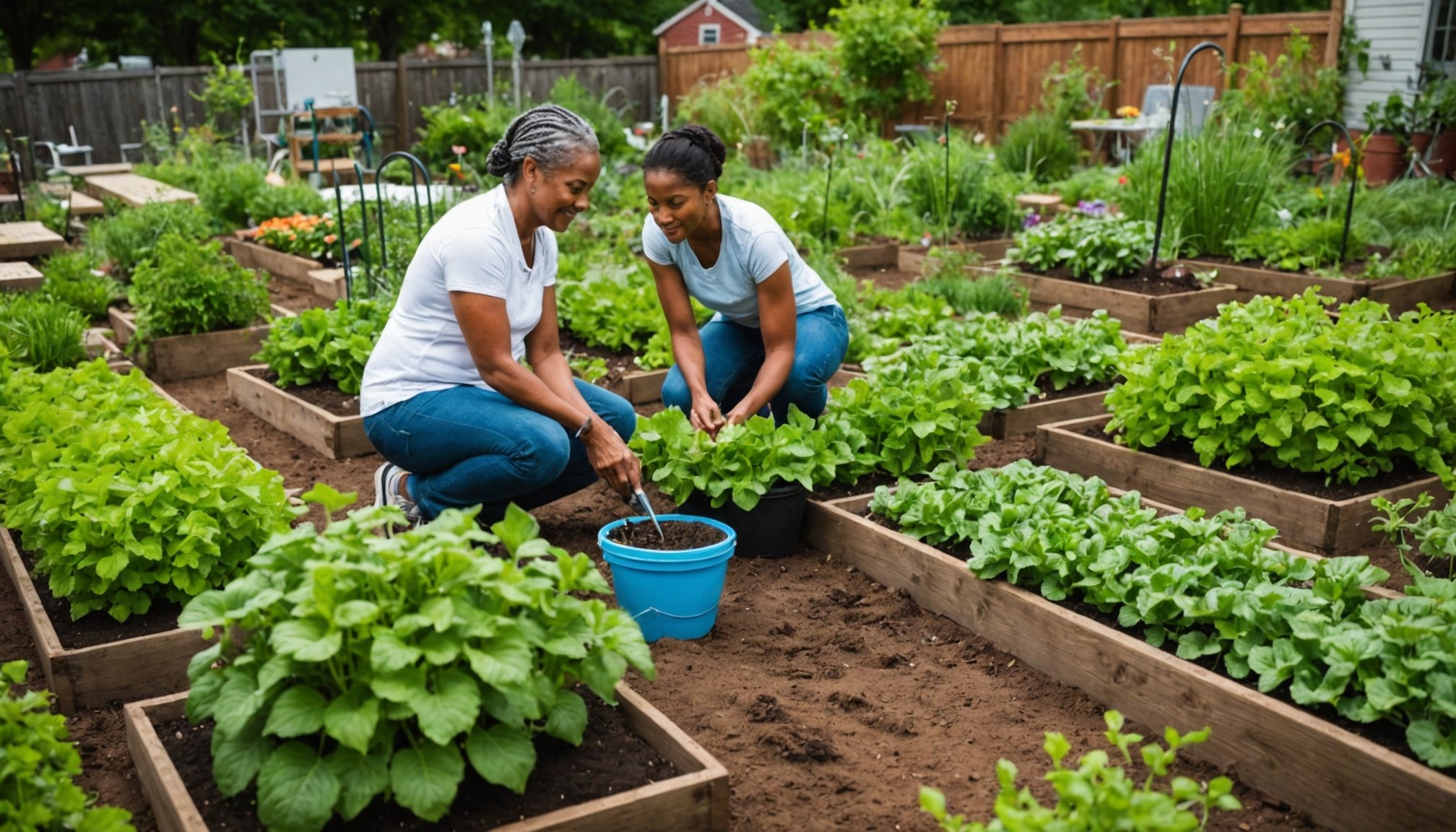Overview of Urban Gardening
Urban gardening is an increasingly popular practice of cultivating plants in metropolitan areas. This approach redefines green spaces within cities, integrating nature into urban settings. By transforming rooftops, balconies, and small city plots, urban gardening plays a crucial role in enhancing the aesthetic and ecological value of urban landscapes.
Definition and Scope of Urban Gardening
Urban gardening encompasses a wide range of activities that go beyond traditional farming. It includes community gardens, vertical gardens, container gardening, and even hydroponics. These methods allow residents to grow vegetables, herbs, and flowers, maximising the limited space available in cities.
Also to see : Supercharge your life with essential dietary supplements
Importance of Green Spaces in Urban Settings
Green spaces are indispensable for urban environments. They help improve air quality, reduce urban heat, and provide habitats for wildlife. Moreover, urban gardens serve as vital areas for relaxation and recreation, offering city dwellers a respite from the bustling urban life.
Overview of Community Gardening Movements
Community gardening movements bring people together to cultivate shared plots of land. These initiatives foster a sense of community engagement and promote collaboration among residents. Through community gardens, individuals can share resources, knowledge, and support, strengthening social bonds and enhancing the overall quality of life in urban areas.
Also read : Unlocking Immune Health in Seniors: The Comprehensive Benefits of Qigong
Physical Health Benefits of Urban Gardening
Engaging in urban gardening offers significant health benefits, particularly by increasing physical activity levels. It serves as a practical alternative to conventional exercise, allowing individuals to burn calories, improve flexibility, and enhance muscular strength while tending to their gardens. Moreover, urban gardening promotes cardiovascular health, as the physical exertion involved is equivalent to a moderate-intensity workout.
Another major benefit is the positive impact on nutrition. When individuals grow their own fruits and vegetables, they gain access to fresh, organic produce. This not only boosts the nutritional value of their diet but also encourages healthier eating habits by reducing reliance on processed foods.
The connection between gardening and health extends to reduced risk of heart disease. Studies suggest that the active involvement in gardening can help regulate blood pressure and decrease the likelihood of developing cardiovascular issues. The serene and peaceful nature of gardening further enhances these benefits by alleviating stress.
In summary, urban gardening fosters a more active lifestyle, encourages better dietary choices, and supports heart health, making it an invaluable practice for city dwellers aiming to improve their physical well-being.
Mental Health Benefits of Urban Gardening
Urban gardening has profound mental health benefits, offering therapeutic effects that enhance overall well-being. It provides a stress relief environment, as tending to plants can be a restorative activity that naturally reduces anxiety levels. The repetitive and mindful nature of gardening promotes a sense of calm and aids in refocusing thoughts, acting as an effective way to engage in mindfulness practices.
The simple act of nurturing plants in an urban garden allows individuals to immerse themselves in the moment, diverting their attention away from daily stressors. This immersion is not merely about avoiding stress but actively engaging the mind in positive activities, which can transform one’s outlook and emotional state.
Engaging in urban gardening also results in a tangible connection to nature, often missing from urban life. This connection reinforces the mind and body relationship, promoting overall mental clarity and emotional stability. Such practices in a community setup further contribute to communal interactions, often fortifying emotional support networks.
In essence, urban gardening presents a unique, accessible method to combat stress and foster mindfulness, significantly contributing to mental resilience in bustling city environments.
Social Connectivity through Urban Gardens
Urban gardens have a unique ability to foster community engagement, creating spaces where social connections flourish. By engaging in collaborative gardening projects, individuals can work alongside others, building friendships and forming supportive social networks.
Building Community Connections
These community-driven initiatives offer opportunities for people to share experiences, knowledge, and resources, leading to improved collaboration and a stronger sense of belonging. As gardeners unite in cultivating shared plots, their collective efforts help build an inclusive atmosphere that strengthens neighbourhood ties.
Case Studies of Success
There are numerous examples worldwide of successful community gardening initiatives that have transformed local areas. These projects highlight the potential of urban gardens to bring people together, encouraging collaboration while also enhancing the quality of urban life. Case studies show that such initiatives lead to meaningful interactions, emphasising the role of urban gardens in fostering social connections.
Beyond Gardening
The benefits of collaborative gardening projects extend beyond just growing plants. They provide a platform for educational opportunities, skill-sharing, and environmental stewardship, further enhancing the social fabric of urban communities. Through shared experiences in the garden, individuals develop lasting relationships, paving the way for a supportive and interconnected community network.
Practical Tips for Starting an Urban Garden
Getting started with urban gardening can be an exciting journey, filled with opportunities and challenges. Here’s a guide to help you embark on this green endeavour.
Selecting the Right Space
The first step in urban gardening is choosing the ideal space. Look for locations with ample sunlight since most plants require at least 6 hours a day. Consider vertical gardening if you’re limited on ground space. Balconies, rooftops, or even windowsills can be transformed into lush gardens with the correct setup.
Choosing Plants for Urban Environments
Select plants that are suitable for the unique conditions of urban settings. Opt for compact vegetables like tomatoes, herbs, or lettuce, which thrive in small spaces. Adaptability is key, so choose hearty varieties that can withstand fluctuating urban climates and pollution levels.
Engaging with Local Gardening Groups
Becoming part of local gardening groups can offer valuable resources and support. These groups share knowledge, tools, and sometimes even seeds, making the journey smoother for beginners. Engaging with such communities is an excellent way to learn best practices and foster a network of fellow garden enthusiasts.
By following these tips, aspiring urban gardeners can successfully cultivate their city-based oases.
Case Studies and Testimonials
Exploring urban gardening through success stories provides valuable insights into how these green spaces transform communities worldwide. One standout project is New York City’s Battery Urban Farm, which revitalizes an area in southern Manhattan into a vibrant community resource, growing various vegetables and herbs. Participants in this project highlight personal health improvements, attributing better dietary habits and increased physical activity to their involvement in the farm.
In London, the Brockwell Park Community Greenhouses stand as a testament to the community impact possible through urban gardening. These greenhouses facilitate educational programs, empowering locals with gardening knowledge and fostering a sense of unity.
Testimonials from individuals engaged in these projects underscore the profound mental well-being health benefits. Many participants report experiencing reduced stress and a heightened sense of calm while gardening, attributing this to consistent interactions with nature and communal bonds.
Apart from personal growth, successful urban gardens have catalysed broader community engagement, enhancing social networks and creating supportive environments. Such gardens become platforms for skill-sharing and environmental stewardship, effectively knitting the community closer together and paving the way for enduring connections.





